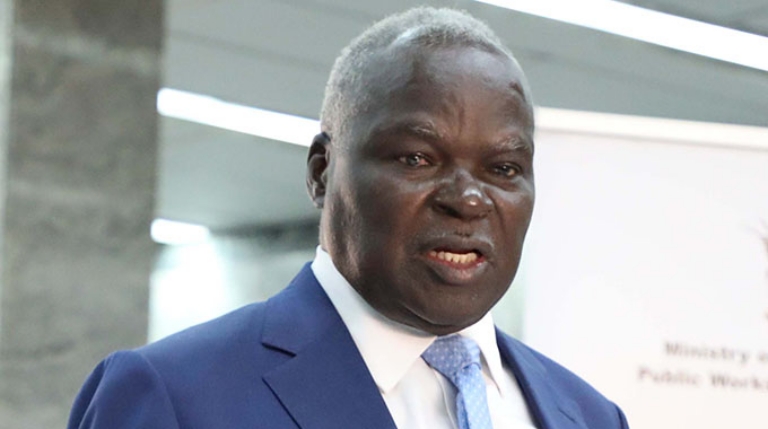By Chipo Gudhe
The traditional social welfare scheme, Zunde raMambo/Isipala seNkosi, is reported to be in disarray in the Midlands, with many chiefs having exhausted their allocated grain and some failing to account for its distribution.
Addressing the Minister of Public Service, Labour and Social Welfare, July Moyo, and delegates at an implementation meeting of the food deficit mitigation program in Kwekwe yesterday, Midlands Province Social Development Officer George Madzima revealed discrepancies in the allocation of grain during routine monitoring in the province’s eight districts.
“Midlands has eight districts with 47 chiefs who were allocated 1,026 tonnes of grain. According to the chiefs’ registers of allocation, 22,622 people are said to have benefited, although some information is in disarray,” he said.
Madzima explained that the monitoring visits did not cover all the chiefs, such as those in Mberengwa with 16 chiefdoms, due to time and resource constraints.
“What we gathered is that the recorded beneficiaries or individuals who have benefited from Zunde raMambo are 22,622. However, many more have benefited, but the registers do not reflect the actual numbers. We could not obtain registers to determine how many people they assisted,” he said.
The monitoring team obtained actual figures from three districts: Mberengwa, Gokwe North, and Zvishavane.
“Mberengwa assisted 10,876 people, according to their registers. Gokwe North, under Chief Chireya, distributed grain to 4,584 people and has a remaining balance of 21 tonnes. Zvishavane assisted 7,198 people. We could not get registers from the other five districts to determine how many people they assisted. Some of their registers were not in order, indicating only a name with no quantity or showing that all beneficiaries received 50kg of grain. In some cases, the beneficiaries did not sign for the grain they received,” Madzima said.
He also highlighted that some chiefs have already exhausted their stock amidst the confusion.
“Some chiefs no longer have a single bag of grain left as they distributed everything. Zunde is meant for emergencies, so what will happen when we have an emergency and need relief?” he questioned.
Madzima urged District Development Coordinators to engage chiefs and raise awareness on proper procedures.
“Chiefs are not supposed to distribute grain; that is the job of Social Welfare. Chiefs should wait for people with specific emergencies to approach them before opening the Zunde basket,” he said.
Madzima said the delays in issuing distribution guidelines by government could have caused the confusion in the distribution system.
“Maybe what could have caused the confusion is that when the Chiefs collected the grain the modalities were not clear on how they were supposed to go about it. It is not their problem but its partly ours as we did not tell them on the onset how they should have operated as they used the old Zunde system,” he said.
Madzima said the other issue could be that the guidelines are in English and some Chiefs could be failing to read and understand them hence the need for them to be transcribed into vernacular languages.
“We need to transcribe the guidelines into vernacular languages,” he suggested.
Minister July Moyo in a side interview said the guidelines will be translated into all the 16 languages with help from higher institutions of learning but he was quick to say Zunde raMambo should benefit families in distress not to be distributed to everyone as it is the duty of the Social Welfare Department.
“We take the point on the issue of language barrier and I am sure institutions like Midlands State University can translate the guidelines into all the 16 languages and we will be making that request. This is not the first time we have had Zunde raMambo in any case it is as indigenous as our history. The President said we are giving them (Chiefs)grain so that they can answer to those in distress not asking them to start their own distribution like Social Welfare. They have been given to make sure that they distribute only when a family is under distress and in instances where social welfare has not reached their areas. It is a spot type of distribution not a coverage like social welfare,” he said.
According to Madzima, Chirumhanzu has two chiefs who were allocated 136.6 tonnes of grain, while Kwekwe has seven chiefs who received 181.7 tonnes and have collected 16 tonnes from the Grain Marketing Board depots. “Gweru has four chiefs who were allocated 88 tonnes and distributed all the grain to 7,198 people. Shurugwi’s three chiefs were allocated 50 tonnes, and they have collected it all from the GMB depot. Gokwe South’s seven chiefs were allocated 165 tonnes and have collected 62.5 tonnes. Gokwe North’s three chiefs were allocated 140 tonnes and have collected 70 tonnes from their GMB depot,” he reported.
Zunder raMambo/Isiphala seNkosi is government’s food relief initiative to assist in emergencies and disaster.



